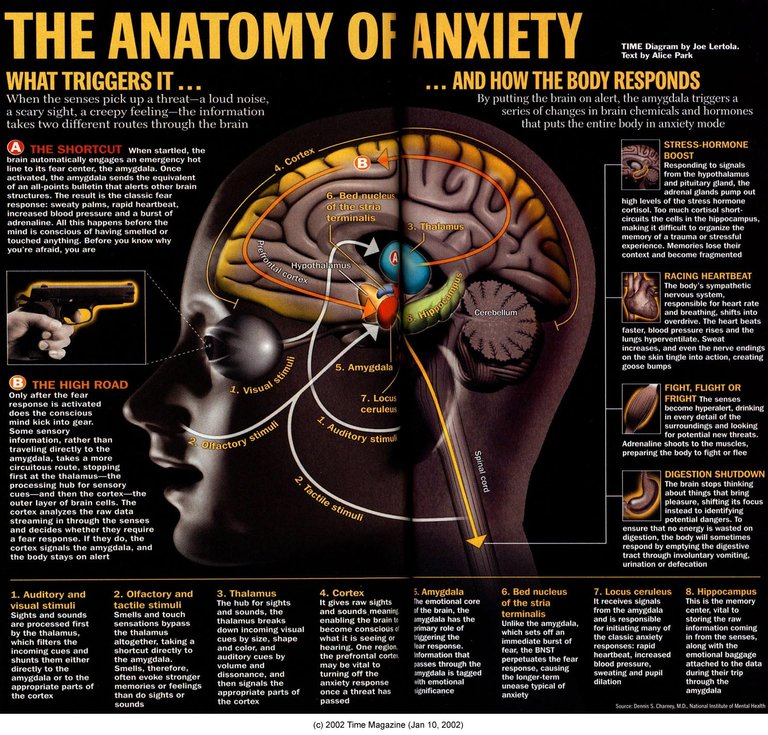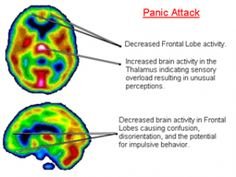
I was diagnosed with depressive anxiety or anxious depression in my early 20s. Now I am 33. That’s more than a decade with this disorder. It’s also labeled in psychiatric terms as mixed anxiety-depression. It’s a condition very frequent where chronic stress leads to a first depressive episode. It’s a rare occasion to find someone who suffers only from clinical depression or pathological/neurotic anxiety. Usually depression and anxiety go hand-hand. Anxiety manifests depression and depression feeds anxiety. It’s how the one reacts to the other.
Since then I had to learn everything there is to know about psychiatric conditions and only those who have suffered this mind state know how debilitating it can be. This condition reached its peak when I was a PhD student where for the first time I experienced full-blown panic attacks. This forced me to quit my PhD and the dreams of a lifetime and seek for a more stress-free lifestyle. Actually, I was a step away from being hospitalized with the suggestion of a private psychiatrist. As a PhD student you rely on grants and to receive them you need to publish a few papers every year. Otherwise, your monthly salary is cut-off and you are forced to quit your PhD. Thus, sometimes it’s a 50-50 chance of someone publishing a paper and students are usually in great stress. They usually work long hours, more than 12 hours, with no weekend breaks, little sleep with a frugal salary. There is a dark side in the PhD life that nobody talks about.
http://www.sciencemag.org/careers/2017/04/phd-students-face-significant-mental-health-challenges
Since my early 20s I have tried multiple antidepressants (SSRIs and benzos). You name it: Zoloft, lexapro, prozac, paxil, valium, zyprexa, lyrica, seroquel and others. When I left my home country (Cyprus) I was about 75kg. When I came back I weighed 97kg. I took one of those heart tests that was offered in the street for free out of curiosity and they told me that I was one step away from a stroke and that I needed to see a doctor immediately. After a 9-month diet I returned to my initial weight and regained my health. One day I woke up and I couldn’t speak. My speech was slurred, my mouth was twitching and I was stuttering. I couldn’t complete a sentence. This forced me not be able to leave the house since I could not talk to anyone. I went to a Neurologist who put me on anti-Parkinson’s medication and after a week I started talking normally again. Now I have managed to detoxify myself from most drugs, especially benzodiazepines, you know, the pills all doctors give like candies without a prescription. Detoxifying and cleansing your body from benzos is pretty much equal to trying to rid yourself from heroin. I can’t even put into words the hellish weeks I had to go through titrating and coming-off benzos.
I am happy now because I am not addicted any more to benzos and I have way better options when I get into a panic mode, if ever this happens because I am informed and I control the symptoms using great tips. Many people who suffered panic attacks the first time without knowing what it is they say that it’s very similar to a heart attack. They usually end-up in the ER the first time and the staff there informs them that it’s nothing. Regardless of how horrifying it is, it’s actually not dangerous at all. Your brain though tricks you as if it is. It’s actually the job of the brain to give you the impression that you are in great danger and mimic the physiological responses of a heart attack. No matter how fast your heart beats and you are out of breath and everything spins around you, you will just have to wait until it’s over. Your mind exaggerates in a ‘what if’ mode. And this is the most important part that anxiety sufferers need to know after going through some brain physiology.

An anxiety sufferer is stuck in a permanent physiological ‘what if’ state. Their bodies are prepared for danger 24/7 and clearly there isn’t one. Their sympathetic systems are over-activated and their parasympathetic system fails to take over when a threatening stimuli is over.
And this interestingly qualifies anxiety disorder as a disorder of perception. Cortisol, adrenaline and amygdala signaling distort the perception of the world around you. This is why paranoia and delusional thoughts are common underpinnings of anxiety. The world around you is different. You perceive the world differently than others. It’s pretty much like living in a savanna and getting ready to be attacked by a lion while hiding in a bush or like being a soldier hiding and expecting the next bomb thrown next to you. You become great at detecting threats that no one else can. And this is what the brain does at an implicit (unconscious) level: detects threats and scans the environment.

Anxiety is constantly scanning the environment implicitly for threats and depression prevents you from moving due to lack of energy. Depression biases someone to implicitly scan, not for threatening information this time but for any information that is saddening, not positive. Now add these two paradoxical opposite states and you get ‘depressive anxiety or mixed episode’.
Anxiety is also a ‘not-knowing’, ‘uncertain’, ‘agnostic’ mode. People tend to categorize their emotions as positive or negative. The ‘anxious’ state is somewhere in the middle. It’s neutral or even better uncertainty. It’s mostly a state of alertness and vigilance, waiting for something to happen, a state of anticipation, more like when you are crossing the street and you are like ‘should I go now or not’?
An excerpt from a very informative article I found:
“We show that in patients with anxiety, emotional experience induces plasticity in brain circuits that lasts after the experience is over,” says Rony Paz of Weizmann Institute of Science in Israel. “Such plastic changes occur in primary circuits that later mediate the response to new stimuli, resulting in an inability to discriminate between the originally experienced stimulus and a new similar stimulus. Therefore, anxiety patients respond emotionally to such new stimuli as well, resulting in anxiety even in apparently irrelevant new situations. Importantly, they cannot control this, as it is a perceptual inability to discriminate.”
.jpg)
Functional magnetic resonance images (fMRIs) of the brains of people with anxiety versus healthy controls showed differences in brain responses, too. Those differences were mainly found in the amygdala, a brain region related to fear and anxiety, and also in primary sensory regions of the brain. These results strengthen the idea that emotional experiences induce changes in sensory representations in anxiety patients’ brains.
The findings might help to explain why some people are more prone to anxiety than others, although the underlying brain plasticity that leads to anxiety isn’t in itself “bad,” Paz says.
“Anxiety traits can be completely normal, and even beneficial evolutionarily. Yet an emotional event, even minor sometimes, can induce brain changes that might lead to full-blown anxiety,” he says.
https://www.sciencedaily.com/releases/2016/03/160303132951.htm
In most studies there are probably correlations with anxiety symptoms and an enlarged or over-responsive parts of the amygdala, too much signaling perhaps and an inability of the prefrontal cortex to shut-down or dump the activity of the amygdala. Interestingly, the striatum (basal ganglia) is also very implicated in anxiety in ways that were unknown before, because the striatum’s primary role has to do with movement and balance and secondary on emotional processing, attention and cognition. The anterior cingulate cortex (ACC) and all subregions underpin partially anxiety also. This region is involved in decision making and emotional regulation, detection of errors, and anticipation and preparation before task performance. In anxiety and OCD sufferers this regions probably does not function optimally when they need to inhibit competing responses from distracters. This is why probably why in anxiety, patients feel that they are processing ‘it all’ at the same time without being able to inhibit information.
this is a great article! keep them coming and please cite your image sources and all your sources for that matter.
Casts some new light on my past experiences.
👍
Good read, quality post! Are you my twin, I too have suffered most of my adult life with the vicious cycle of anxiety->depression and visa versa. I always have said that that when in the midst of the cycle I feel fragmented and unable to think clearly.🐓
Very thorough read.
Something that really worked and works well for me to work through anxiety and depression is to write a ton about these emotions and trace them back to where they started. It only works if you are honest with yourself when you write and don't leave out details deliberately when you write or speak about it. So, yeah, speaking about or writing about my experience to myself helps a lot to stabilize when I am in anxiety or depression.
Thing I have realized with anxiety and depression is that it helps to define the experience for yourself. In detail. How exactly it feels. Where you feel it. And then you redefine your own relationship to anxiety and depression.
For example, an excerpt of what I did:
"When I start feeling anxiety I don't allow myself to immediately go into an acceptance and inferiority towards it. I don't see it as more powerful than me. I am able and powerful to work through the anxiety."
Then I would either breathe, write or speak about the experience. So, essentially I’d act on the statement above (not just speak it, lol). But always in a starting point that I am not accepting the anxiety to define and control me -- that I am doing something about it. That I am directing myself through the anxiety experience and period of it.
Give it a shot this way if you haven't. :)
And, thanks for sharing the writing. :)
upvoted and followed!
Thanks for sharing. I'm in the similar boat. Almost suffered severe anxiety for 10 years now. Part of it is the cost of being a high achiever. I've tried everything, all tablets out there. I did all the scan for brain chemical stuff. Everything scientific means you could think of. Today I just came back from seeing my psychiatrist, we don't want to go down to the chemical path again. If you want to get into the essence, here's what I found useful: 1) Accept it - it's OK, you're not alone. It's pretty messed up I know; 2) Do more exercise to find an outlet for the nerve and excess energy, 3) Practice breathing and mindfulness, know what you are "worrying" and detach yourself from - "Anxiety, I'm telling you now, you have no power over me", 4) Don't think too much - Don't try to intellectualise it what's lurking. It's all in the head and sorry about the cliche: mind over matters. Best of luck!